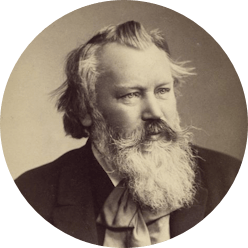
Johannes Brahms
May 7, 1833 - Hamburg (Germany) — April 3, 1897 - Vienna (Austria)
About
Johannes Brahms, the last of the giants of the Germanic 19th century
Johannes Brahms was, to quote Robert Schumann, “The one destined to come”. In the northern mists, Brahms made his musical debut in Hamburg following in the steps of his musician father. Taught as a pianist, he played in the taverns and bars before going on a concert tour with the violinist Eduard Reményi who introduced him to the great Romantic violinist, Jozef Joachim. However his most decisive and significant encounter was to be with Schumann, to the extent that Brahms signed his first scores, “Kreisler Junior” to pay homage to the great master of Kreisleriana.
Johannes Brahms: his work
Johannes Brahms held distinguished musical posts in Vienna, (at the Singakademie then the Gesellschaft der Musikfreune) and his symphonies, concertos and sonatas exemplifying radiant classicism and vigour compelled recognition. They were brilliantly conceived and firmly rooted in the music of Haydn and Beethoven. If Franz Liszt was to innovate the symphonic poem and Richard Wagner revolutionise the musical drama, Brahms dreamed of pure music detached from pretext or picturesque description.
From hieratic fervour to melancholic nostalgia, Johannes Brahms often wrote anxious works with perfectly mastered musical language. A German Requiem, the Four Serious Songs, (Vier ernste Lieder), or Hungarian Dances are perfect protean examples of a composer inspired by both sacred grandeur and light-hearted folklore. His last, crepuscular works for piano (opus 116 to 119), the “lullabies of his pains”, are short poetic pages at the edge of silence. In his article, “Progressive Brahms”, Arnold Schoenberg did not fail to note the modernity of a composer too often judged as classical or conventional.

